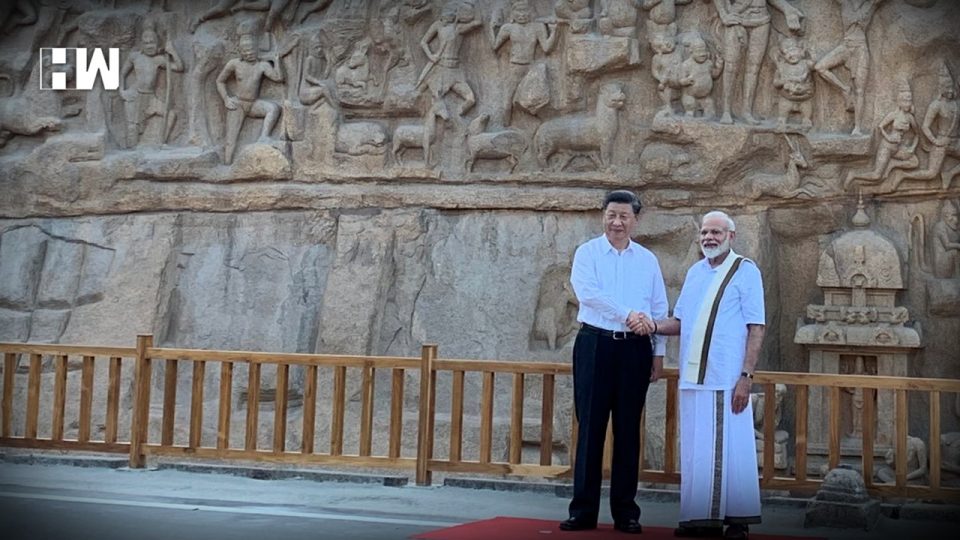At around 56 km from Chennai, this port city Mamallapuram held significance in trade between India and China in ancient times
Today in Mamallapuram in Tamil Nadu, Prime Minister Narendra Modi and Chinese President Xi Jinping will be conducting the second informal visit. This came as a surprise to many. But the selection of venue was fashioned by certain considerations – interest of President Xi in history and culture, the region’s ancient connection with China and also the BJP’s political ambition in Tamil Nadu as this can give some publicity during assembly elections.
Mamallapuram also called Mahabalipuram, is located on the East Coast Road. The name is said to be derived from the word “Mamallan”, which means the great warrior, a reference to King Narasimhavarman I of the Pallava dynasty, who ruled the region from AD 630 to almost AD 670 and was also known for his love of art and sculpture. Many of the monolithic rock-cut structures that are now seen in this region were created during his time.
PM @narendramodi and President Xi Jinping are at the Pancha Rathas complex in Mamallapuram. pic.twitter.com/ejVC1aBtxH
— PMO India (@PMOIndia) October 11, 2019
The city has been a point of interest to archaeologists and other scientists all these years. In 2004, when the Indian Ocean tsunami hit the coast, several new scriptures and evidence of ancient times came out even in the offshore areas of Mamallapuram. Excavations underwater, near the famous Shore Temple, also revealed several reminiscences of history, including ruined walls, sculptured stones, and other monuments.
Pallava Prince Bodhidharma’s China voyage:
Besides this, the rule of the Pallava dynasty in Tamil Nadu is an ancient story. This is the story of a Tamil prince who is revered in China by millions as Bodhidharma. His real name is not really known but he is believed to have been a Pallava prince and was the third son of the king.
At around 56 km from Chennai, this port city held significant importance in trade between India and China in ancient times. During the age of the Pallava dynasty, Mamallapuram was one of the major ports in South India and the main connecting point for trade with China. Many articles including pottery have been found in Mamallapuram and the neighbouring areas showing close trade relationships with the Chinese.

At an early age, he turned to Buddhism, mastering “Dhyan”, a form of meditation that was once taught by Gautam Buddha. He was also a master of traditional weapon-less warfare in South India. After having risen through the ranks in a Buddhist monastery, Bodhidharma became the 28th patriarch of the organization. Chinese texts place him in a direction chain beginning from Gautam Buddha.
The followers of Bodhidharma travelled to China as a messenger of Buddhism. He remained, according to prevailing legend, extremely reclusive for nine years during which he did not speak to people who were mesmerized with his Dhyan meditation and display of martial arts.

A legend saying that a Chinese king named Wu summoned him to his palace hoping to receive blessings from Bodhidharma but expelled the Buddhist monk after he did not speak positively about the king.
This Bodhidharma connection of Tamil Nadu or Mamallapuram makes the choice of the venue more obvious for hosting President Xi.
India wanted to highlight the ancient connection between two countries:
The decision to host Chinese President Xi Jinping for the second informal summit in the coastal city of Mamallapuram in Tamil Nadu was taken by Prime Minister Narendra Modi himself.
Government sources said that choosing Mamallapuram as the destination for the second informal summit was a well thought out one and that “PM Modi himself decided on Mamallapuram since he was familiar with the historical connection between Chennai and China”.
According to sources, India wanted to highlight the historical ties that exist between India and China.
As an independent media platform, we do not take advertisements from governments and corporate houses. It is you, our readers, who have supported us on our journey to do honest and unbiased journalism. Please contribute, so that we can continue to do the same in future.

